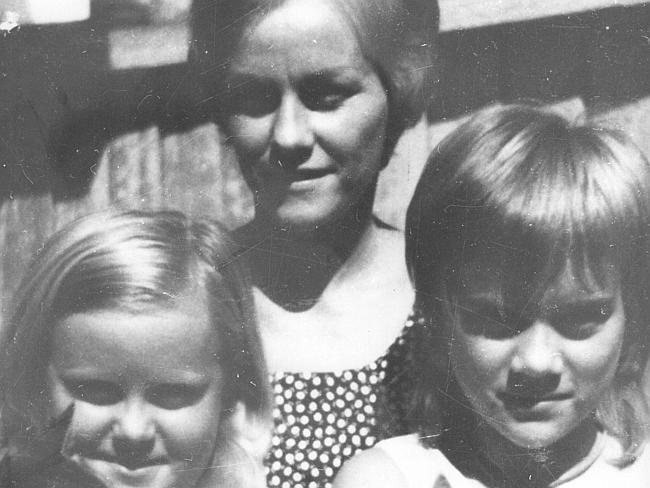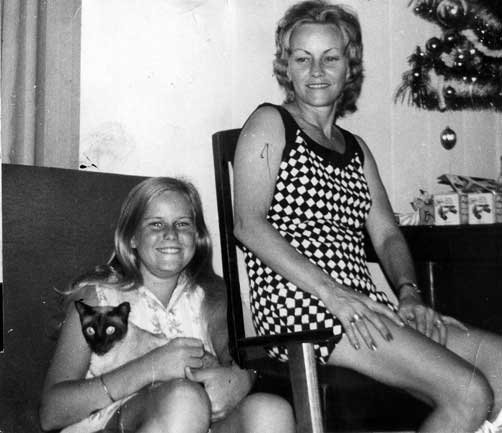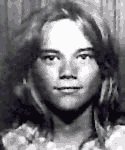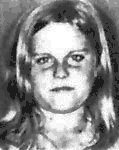On January 16, 1974, Brisbane snack bar attendant Barbara McCulkin and her daughters Vicki, 13, and Barbara, 11, disappeared without a trace from their home in Dorchester St, Highgate Hill.
The 34-year-old and her daughters were never seen again.
Investigations initially suggested the trio were killed to stop Ms McCulkin revealing information on gang activity but cold case detectives are now looking at other possibilities.
Acting Superintendent Mick Dowie said most murders against children were part of revenge in a domestic dispute or sexually motivated.
He said the former partner of Barbara McCulkin, Billy McCulkin, was not a suspect, leaving police with the latter option.
"We've spoken to someone who has caused us to focus on that as a motive and put aside all of the scandal and association of this murder with all the criminal activity occurring at the time," he said.
When the McCulkins disappeared, their home was left unscathed, with the family's two cats locked inside, lights still on, a blouse in the sewing machine and a purse left on the fridge.
"It is one thing to murder an adult - it is another thing to murder children who could never be considered a threat to a criminal organisation," he said.
"Someone, anyone will have to have had that on their conscience."
Supt Dowie said the two men who had been committed to stand trial over the trio's murder but had their charges dropped were still alive in Queensland but had not been spoken to recently.
He said police had not received any tip offs through Crime Stoppers in the past year but were hopeful the anniversary would spark new interest and information coming forward.
"What we have is a situation that this investigation has been hampered by the lack of willingness from the public to come forward with information," Supt Dowie said.
"What we're now hoping that after 40 years of carrying that on their conscience and with the knowledge they are carrying it on their conscience for the wrong reasons they may consider coming forward."
He said even to find the bodies of the missing mother and daughters would be an important step for the family looking for closure.
Anyone with information which could assist with this matter should contact Crime Stoppers anonymously via 1800 333 000 or crimestoppers.com.au 24hrs a day.
Garry Dubois found guilty over 1974 deaths of Barbara McCulkin and two daughters
Updated
Garry Dubois has been found guilty of the 1974 murders of Brisbane sisters Vicki and Leanne McCulkin and the manslaughter of their mother Barbara.
A Supreme Court jury took almost three days to hand down its verdict, finding Dubois had also raped the two girls.
The family disappeared without a trace 42 years ago and the bodies have never been found, leading to what was one of the most high-profile cold cases in Queensland.
The three-week trial heard Dubois, now 69, was motivated to kill Ms McCulkin out of fear she would implicate him in a series of Brisbane nightclub fire bombings.
He was silent as the verdicts were delivered.
He briefly spoke to his wife and waved to his supporters as he was taken from the dock.
He had pleaded not guilty to all charges, but several witnesses told the court they saw Dubois at the McCulkins' Highgate Hill house on the night the victims disappeared in 1974.
Defence barrister Dennis Lynch had told the court in his closing statement that it was possible they were murdered by father and husband Billy McCulkin.
He had also attacked the reliability of key prosecution witness Peter Hall, who told the court Dubois confessed to him in the days after the family disappeared.
"It's abundantly clear that Peter Hall has told lies, it's abundantly clear that he continued to lie," Mr Lynch told the court.
"His reason for telling a lie was to save his own neck because it had been made painfully obvious to him that he wasn't believed. He simply fell into line."
Dubois' legal team said it would investigate the chances of an appeal, and would make a decision in the next month.
The McCulkin family did not speak outside court, but stood beside Detective Inspector Mick Dowie who talked to the media on their behalf.
"On behalf of the investigation team, and more importantly the Ogden and McCulkin families, we wish to advise that we welcome the verdicts of guilty delivered today by the jury," he said.
Indemnity offered to Dubois
Dubois' wife Jan, who has been in court for the entire trial, said her husband was not a killer.
"No, not a chance. He is not capable of that," she told Nine News.
"I would not be with him."
Ms Dubois said investigators had offered her husband a deal if he testified against another man, with an offer to put the family into witness protection.
It was an offer rejected by Dubois.
"It is just not the right thing to do," Ms Dubois said.
"Send someone to jail just to ... wrong wrong."
Dubois 'spoke in gruesome detail' about murder
A suspected connection between the 1973 fire which killed 15 people at Brisbane's Whiskey Au Go Go nightclub and a blaze at a second venue was motive for the murders, the trial heard.
Dubois, Mr Hall and two others were paid to burn down the Torino nightclub in February, 11 days before the Whiskey Au Go Go blaze, Crown Prosecutor David Meredith told the court.
Dubois worried if police found out about his involvement in the Torino fire he would be implicated in the one at Whiskey Au Go Go, and believed he needed to silence Ms McCulkin.
Mr Hall told the trial he and Dubois used to hang out and engage in criminal activity together.
He said he and Dubois had been involved in the 1973 firebombing of the Torino nightclub, along with two other men.
The court heard that on the day the three went missing, Dubois asked Mr Hall if he wanted to come to the McCulkins "to have sex with the girls".
Mr Hall said he declined.
He said Dubois had spoken in gruesome detail regarding Barbara McCulkin's murder.
Co-accused Vincent O'Dempsey will face a separate trial next year over his alleged role in the McCulkin killings.
Dubois faces a mandatory sentence of life behind bars, but a date has not yet been set for sentencing.
McCulkin murders: Vincent O'Dempsey guilty of killing Brisbane woman and daughters
Updated
Vincent O'Dempsey has been found guilty of murdering Barbara McCulkin and her two daughters, finally giving closure in a 43-year-old cold case.
After a four-week Supreme court trial, it took the Supreme Court jury in Brisbane a day to find O'Dempsey guilty of the killings.
They 78-year-old did not flinch when the verdict was read, and sat stony faced.
The prosecution successfully argued O'Dempsey, who knew the McCulkins, killed the trio to silence Barbara over her perceived knowledge of two nightclub fire bombings.
It comes after his co-accused, Garry Dubois, was found guilty last year of raping and murdering Vicki, 13, Leanne, 11, and the manslaughter of their mother, Barbara, 34.
They disappeared from their Highgate Hill home in Brisbane in January 1974 and their bodies have never been found.
It had long remained one of Queensland's most notorious unsolved murder cases.
Outside court today Barbara's nephew Brian Ogden made a statement, saying they had waited 43 years for justice.
The family have endured "endless rumours, victim blaming, mistruths and time wasters".
He remembered Barbara as an excellent mother, and a good and generous lady.
Vicky and Leanne were "nice kids with many friends, and were busy just being kids".
Brian said his father, Barbara's brother Graham Ogden, never stopped trying to understand what happened, and would call the police for new information each anniversary of their disappearance.
The family thanked the witnesses for testifying despite personal risk, and everyone involved in the case.
More than 50 witnesses testified, including three who said O'Dempsey had made admissions to them about the killings.
Hopeful bodies will be found
Detective Inspector Mick Dowie said they were still hopeful of finding the bodies.
"And they're not assisting at this point in time.
"Hopefully they may assist in the future but I find that highly unlikely."
Detective Inspector Mick Dowie thanked the witnesses for their courage and willingness, and also thanked the police officers involved in the investigation.
"I'd like to acknowledge the outstanding work of the recent investigation team," he said outside court.
"They did an outstanding job in collecting fresh evidence presented at both trials.
"I'd also like to acknowledge the outstanding job done by investigators over the past 40 years.
"Without their work, we could not have been able to present such a
compelling circumstantial case."
When questioned about other families' involved in cold cases, the commissioner continued: "I don't want to build hope for other families".
"As we've heard from the family there's lots of rumours and false info comes forward and builds people's hopes.
"We have a motto — they may be gone but they're never forgotten, and that's true and that's been proven here today."
McCulkin triple murder: The 40-year wait for justice
Updated
The disappearance of Barbara McCulkin and her two daughters in Brisbane in 1974 looked suspicious to police right from the start, but it would take more than 40 years to convict their killers.
At one point in the late 1980s, Garry Dubois and Vincent O'Dempsey were charged over the murders — only to be let off because of a lack of evidence.
They were known associates of the family through Ms McCulkin's estranged husband Billy, who was a part of a Brisbane gang.
Days after McCulkin and her daughters vanished, Brisbane was swamped by the 1974 floods and the suburban mother and her two children, Vicki, 13, and Leanne, 11, did not make headlines for another two weeks.
McCulkin's estranged husband Billy told the press he believed his family had been targeted by a criminal gang.
By the late 1970s, speculation was surrounding O'Dempsey.
In a bid to quell the rumours, he gave a statement to the city's newspaper, the Brisbane Telegraph.
"I have never murdered anyone, nor do I have any intention of murdering anyone," he said in the article published on July 6, 1979.
O'Dempsey confirmed he had been questioned by police but denied any involvement.
"I will not be making any further comment to police nor to other members of the media," he said at the time.
The article described how he was working as a maintenance man for a church settlement in Gympie, north of Brisbane.
Insufficient evidence in 1975 for charges
The following year, an inquest heard both O'Dempsey and Dubois were seen leaving the McCulkins' house the night they vanished.
The pair was charged but the police case was eventually dropped on the grounds of insufficient evidence.
The investigation stalled but the McCulkins would not be forgotten.
While police had the pair flagged as suspects for years, politicians also raised specific concerns.
In 1988, while attempting to further expose the seedy underbelly of Brisbane, Labor MP Len Ardill addressed the case in parliament, linking O'Dempsey and Dubois to the family disappearance.
"In January 1974, the McCulkin family — except for Billy McCulkin — disappeared," he said.
"The name of O'Dempsey again emerged, together with one Gary Dubois.
"The cancer of corruption has so infested this state that so-called accidental deaths, so-called suicides and obvious murders no longer are cause for public concern.
Cold case revisited in 2014
Then on the 40th anniversary of their trio's disappearance, detectives renewed their push to solve the cold case.
Detective Inspector Mick Dowie fronted the media in 2014 and elaborated on various possibilities.
He said while previous investigations speculated Barbara McCulkin was targeted for what she thought she knew about the fatal Whiskey Au Go Go bombings, it may have been a sexually motivated crime.
The prosecution successfully argued in the four-week trial that the family was silenced over her perceived knowledge about the fire bombing, which killed 15 people.
"It has been raised before, it was talked about at the inquest way back when — so we're focussing on that," Detective Inspector Dowie said.
"We're appealing to anyone who has such information and has been sitting on it to examine your conscience and get in contact with us and provide us with information that may solve this case."
Detective Inspector Dowie would not confirm at the time whether O'Dempsey and Dubois were still suspects.
"If the opportunity presents or if there is a need to we will, as we will speak to anyone who may be able to assist us," he said.
Then finally, a real breakthrough came when witness Peter Hall told a secret Crime and Corruption Commission hearing that Dubois confessed to him in 1974.
In October 2014, O'Dempsey was arrested at his Warwick farm, west of Brisbane, while police swooped on his old acquaintance Dubois, who was living on the Fraser Coast.
Billy McCulkin killed own family, second wife said
But as police were preparing for the trials, one final twist would almost undo the prosecution's case.
Billy McCulkin's second wife, Fe McCulkin, went to police with claims that her ex-husband was responsible for murdering his own family.
She told a pre-trial hearing that she had discussed the allegations with her friend Tony Bellino before going to authorities.
Fe McCulkin claimed her ex-husband confessed before his death in 2011.
"He said that he brought them to Toowong [cemetery in Brisbane], the three of them, and he put some gravel and then cement on the top.
"I want to tell the truth because my conscience is telling me I cannot sleep some times in the night — as far as I know, these two boys are not guilty."
Prosecutors would later strike down her evidence as false before the trial began.
There were twists and turns but after 43 years, one of Brisbane's most infamous crimes has finally been put to rest.
McCulkin murders: Cold-blooded killers Vincent O'Dempsey, Garry Dubois sentenced to life in jail
Updated
Convicted killers Vincent O'Dempsey and Garry Dubois have been sentenced to life in jail for the deaths of Brisbane mother Barbara McCulkin and her two daughters, Vicki and Leanne, in 1974.
The 34-year-old mother, 13-year-old Vicki, and 11-year-old Leanne, have not been seen since the night of January 16, 1974, when they disappeared from their home at Highgate Hill in Brisbane.
Their bodies have never been found.
Last week, 78-year-old Vincent O'Dempsey was found guilty of murdering the trio and deprivation of liberty.
In a separate trial last year, his co-accused, Dubois, now 70, was deemed responsible for Barbara's manslaughter and the rape and murders of Vicki and Leanne.
At today's sentencing hearing in the Supreme Court in Brisbane, the court heard modern laws allowing the court to set a parole eligibility date could not be applied retrospectively.
Justice Peter Applegarth told both offenders they were cold-blooded, heartless killers who showed no remorse and would likely die in jail.
Justice Applegarth said O'Dempsey had boasted about killing the McCulkins and getting away with it.
"You are a hardened killer and a criminal who has no conscience," he said.
The killers were known associates of the family through Ms McCulkin's estranged husband Billy, who was a part of a Brisbane gang.
McCulkin's estranged husband Billy told the press he believed his family had been targeted by a criminal gang.
Justice Applegarth said O'Dempsey murdered a defenceless woman, was a child killer and beyond redemption.
Last hours of family 'must've been terrifying'
Justice Applegarth said Dubois had no conscience, was a coward and now a callous old man who had aided killer O'Dempsey and continued to do so out of fear.
He said O'Dempsey used intimidation and traded on his reputation as a "mad dog".
Justice Applegarth said like a coward, Dubois had obeyed O'Dempsey and aided in killing and raping the girls.
Dubois began talking over the sentence and Justice Applegarth told him to shut up. When he did not, he had Dubois removed from the courtroom.
Justice Applegarth said the last hours of Barbara, Vicki and Leanne's lives "must've been terrifying".
He said Dubois was a coward but O'Dempsey had been the prime offender.
Justice Applegarth said it was clear that Barbara McCulkin knew enough about each of the pair's roles in nightclub bombings at the time for them to want to silence her.
He said Dubois and O'Dempsey had escaped justice for decades.
"Luck was on your side. So was the fear you instilled in others," he said.
"At least three things have ensured justice at last. First, the dedication of police. Second, the testimony of dozens of witnesses. Third, the conscience and courage of some key witnesses at each of your trials.
"You can have no expectation of early parole. If you maintain your silence over where the bodies are buried you could not reasonably expect to ever be granted parole."
Killers profess innocence
Earlier in the hearing, Justice Applegarth had allowed O'Dempsey to read a handwritten note to the court, where the killer said he had been wrongly convicted on false testimony and never had any reason to harm the McCulkins.
Dubois also requested to speak but had not prepared anything in writing so was not able to address the court directly.
Outside court, O'Dempsey's lawyer Terry O'Gorman said his client was innocent and had been convicted on unfair testimony, including statements from Billy McCulkin, who had since died.
"I would like to acknowledge the grief and the angst that the McCulkin family have been through," Mr O'Gorman said.
"[But] what sort of a system allows a person to be convicted on the evidence of a person who the defence said was an even greater suspect than us, when in fact the system and the law allows him to give evidence from the grave and not be cross-examined.
"I extend my sympathies to the McCulkin family, while at the same time repeating what Vince O'Dempsey has said: he is innocent of these charges."
'The world had passed my family by'
Barbara McCulkin's nephew Brian Ogden read a victim impact statement to the court on behalf of his father Graham Ogden.
Mr Ogden said his father had mourned the loss of his "kind and bubbly" sister and his "happy, well-behaved" nieces for more than 40 years.
He said he had not been aware of Barbara's former husband Billy McCulkin's criminal activities and the threat he had put Barbara under by his associations.
Mr Ogden said when the leads ran cold for 30 years he had "felt particularly helpless … it seemed the world had passed my family by".
"My sister was a kind and bubbly person with an often wicked sense of humour," he said.
Mr Ogden said the family wanted the murdered trio's remains found.
"It is my fervent wish that someday, the remains of our loved ones will be found so that we can finally lay them to rest," he said.
"General speculation over the years has made Barbara and the girls public property.
"This has led to all sorts of rumours, victim blaming, misinformation and lack of respect.
"By seldom casting a light on their personalities, it has made them seem like secondary and shadowy figures.
"I have mourned the loss of my sister and nieces for nearly 43 years."
Mr Ogden said the defendants did not deserve sympathy because of their ages.
"They have made their choices and had all the benefits of a long life," he said.
"These things have been brutally denied to my sister and nieces — they should be with us still, leading rich and vibrant lives.
The hearing adjourned with McCulkin relatives embracing and wiping away tears in the court room.
Claim Angel of Death said missing man ‘wouldn’t be talking to anybody any more’
A MAN claimed triple murderer Vince O’Dempsey once declared that a man who ratted him out to police “wouldn’t be talking to anybody any more” after the young worker vanished.
In an extraordinary move, the State Government on Tuesday offered a $250,000 reward for information to help solve the murder of Raymond Vincent “Tommy” Allen who vanished 55 years ago.
In the early 1960s, O’Dempsey – who has been dubbed the Angel of Death – worked on the construction of the Leslie Dam near Warwick where he befriended co-worker Mr Allen.
Mr Allen would later assist police in relation to the robbery of two jewellery stores near Warwick.
Police questioned him in 1964 and he agreed to give evidence against O’Dempsey in court.
But he disappeared and the charges against O’Dempsey were dropped.
Mr Allen, 22, was working as a railway labourer at Karara, near Warwick, when he vanished on April 18, 1964.
He was last seen in Grafton St, Warwick, getting into a maroon Holden vehicle with a white roof.
Mr Allen was due to play for Eastern Suburbs Rugby League team the next day.
Homicide squad Detective Inspector Damien Hansen yesterday said police wanted to speak to a member of the public who spoke to a football team player in the dressing room on Sunday, April 19, 1964.
“That conversation concerned what we believe is the murder of Mr Allen,” he said.
“And we ask that anyone who has any knowledge of that conversation or was present that day to make contact with us.”
Det Insp Hansen said police had a person of interest but declined to reveal who it was.
In 2017 O’Dempsey was jailed for life for murdering Highgate Hill mother Barbara McCulkin, 34, and her daughters Vicki, 13, and Leanne, 11, in January, 1974.
During his trial the jury was told the mother might have been killed because she knew information about the Whiskey Au Go Go firebombing which killed 15 people in 1973.
In 1980 a joint inquest was held into the disappearance of the McCulkins, Mr Allen and prostitute Margaret Ward.
Mrs McCulkin’s husband Billy McCulkin spoke at the inquest about a conversation he claimed to have had with O’Dempsey over a drink in a hotel in 1974 when the gangland figure talked about putting people in a dam at Warwick.
“He made a statement to me that there was a person in Warwick or near Warwick … that wouldn’t be talking to the police any more,” Mr McCulkin told the inquest.
“I asked what he meant by that and his reply was, ‘old Vince (Tommy Allen) won’t be talking to anybody any more’.”
The coroner was unable to find how or where Mr Allen died.
“The cause of his disappearance would seem to be directly linked to the fact that he was required to give evidence against Vincent O’Dempsey in a criminal proceeding, and there is ample evidence of a motive for his death,’’ the coroner said at the time.
At the time of his disappearance Mr Allen was described as being a flamboyant man who wore “loud shirts” and leopard skin pants.
He was described as a member of the “bodgie cult” who talked tough.
He was said to be about 160cm tall, with fair hair and blue eyes, large, protruding ears and a nose slightly bent to the left.
Mr Allen had a scar between his eyes, above his nose.
He had a tattoo on his right arm of a girl’s head in a heart with an arrow.
Police Minister Mark Ryan said cold case detectives would never give up and appealed for people to come forward and “let justice be done” for Allen, his family and friends.
The reward also offers an indemnity from prosecution for any accomplice who did not commit the crime.
Crime Stoppers: 1800 333 000



